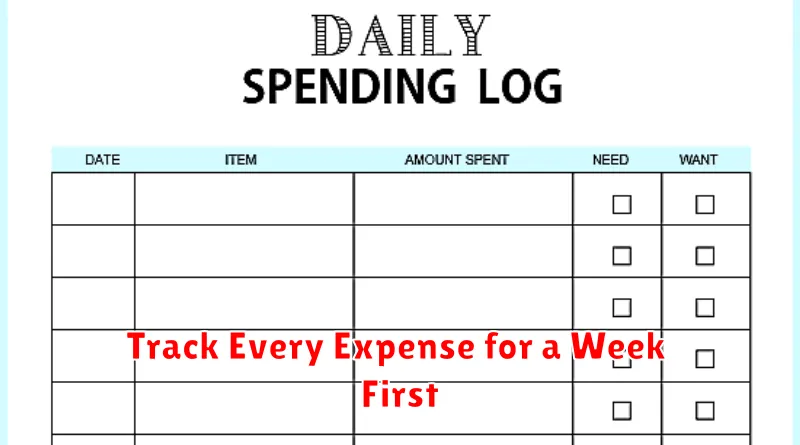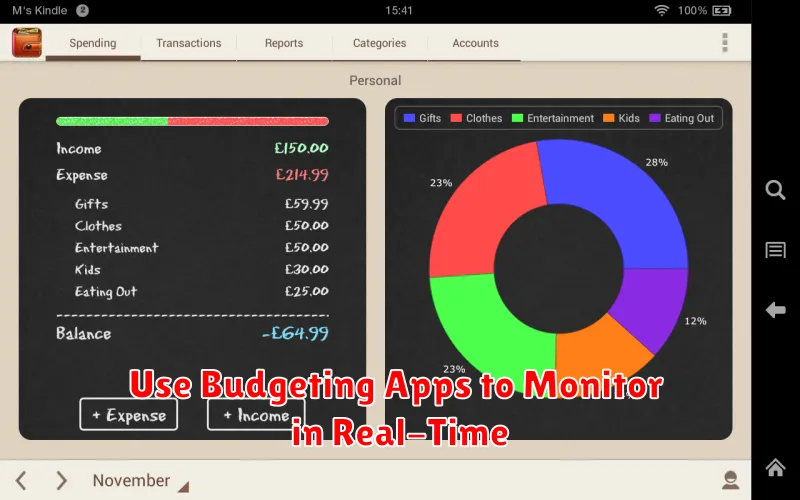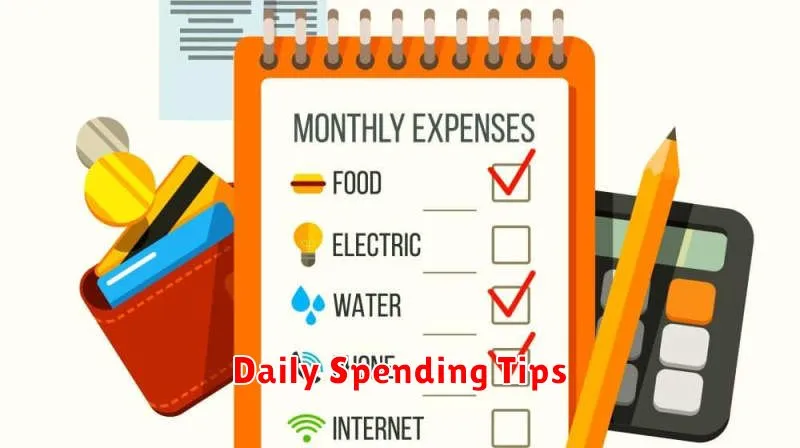In today’s fast-paced world, maintaining a healthy financial balance is more crucial than ever. Understanding how to control your daily spending without feeling deprived can significantly impact your financial well-being, allowing you to enjoy life while saving for the future. This article delves into practical strategies that help you manage expenses effectively, ensuring you don’t have to sacrifice your lifestyle. From setting realistic budgets to identifying essential versus non-essential spending, discover how to maintain financial discipline without compromising on the joys of life. By mastering these techniques, you can achieve your financial goals while feeling empowered rather than restricted.
Track Every Expense for a Week First

One of the most effective strategies to gain control over your daily spending is by tracking every expense for a full week. This method offers you a clear and accurate picture of where your money is going. By documenting each transaction, you become more aware of spending patterns and can identify areas where you may be overspending.
Start by recording every single payment, from major purchases to the smallest expenses like coffee or bus fare. Use a notebook or an app on your smartphone to keep this information organized. Consistency is key; ensure that you document each expense as soon as it occurs to avoid missing any details.
After a week, review your list. This analysis will highlight non-essential purchases and habitual spending that might be adjusted or eliminated. Such insight is invaluable for creating a realistic budget, enabling you to allocate funds more wisely, and most importantly, without feeling deprived.
By understanding exactly how your money is spent, you empower yourself to make informed financial decisions. This initial step is crucial for managing your daily expenses with confidence and ensures that your spending aligns with your financial goals.
Separate Needs from Wants with Clear Rules
To gain control over your daily spending, it is vital to distinguish between needs and wants. Needs are the essentials required for survival and basic well-being, such as food, shelter, and healthcare. In contrast, wants are non-essential items and services that enhance comfort and leisure.
Begin by creating a comprehensive list of your monthly expenses and categorize each item as a “need” or “want.” Review this list critically and assign clear criteria to help you identify each category. For example, while eating is a need, dining at a high-end restaurant falls under a want.
Develop strict but realistic rules to guide your spending decisions. Set a budget that prioritizes needs and establishes a limit for wants, ensuring you are not deprived of enjoyment while maintaining financial health. Regularly assess and adjust these rules to accommodate changes in your life circumstances.
By implementing clear guidelines, you can make informed financial decisions that provide both security and satisfaction, ensuring you manage your finances without feelings of deprivation.
Use the 24-Hour Rule for Impulse Buys
One effective strategy in managing your daily expenditures is implementing the 24-hour rule. This approach involves taking a pause before making any non-essential purchases. By waiting for 24 hours, you allow yourself time to contemplate whether the item is genuinely necessary or simply an impulse buy.
The time you take to reflect can significantly aid in distinguishing between a momentary desire and a genuine need. During this period, evaluate how the purchase aligns with your financial goals. Is this item enhancing your living standard, or does it merely serve a fleeting desire?
This method also leverages delayed gratification, encouraging more thoughtful spending rather than impulsive actions that might compromise your budget. By consistently applying the 24-hour rule, you train yourself to be more disciplined, ultimately controlling your spending without feeling like you’re constantly deprived.
Carry Cash Instead of Cards for Small Purchases
In our increasingly digital world, it’s easy to rely on credit and debit cards for everyday purchases. However, opting to carry cash for minor expenses can be a powerful way to manage your spending effectively. This approach not only limits impulse buying but also provides a tactile sense of expenditure that can be lost when swiping a card.
When you use cash for small purchases, you become more aware of how much you are spending. Feeling the physical act of handing over a bill makes the transaction more concrete, which can help reinforce self-control. Additionally, carrying a set amount of cash limits your ability to overspend, as you can only purchase what you have on hand.
This method encourages mindful spending and can aid in achieving financial goals without feeling restricted. By setting aside a specific amount of cash each week for small purchases, you are less likely to exceed your budget. This practice instills discipline while still allowing you the freedom to make necessary purchases.
Set Daily Spending Limits and Stick to Them
To effectively manage your finances without feeling deprived, it’s essential to set daily spending limits. Start by calculating a realistic budget that covers your essential expenses and allows some room for discretionary spending. This ensures you can enjoy small luxuries without breaking the bank.
Once you’ve established your daily limit, use tools like budgeting apps to track your expenses in real time. This visibility helps in making informed decisions about your spending habits.
It’s also important to cultivate discipline. Maintain the habit by reviewing your budget regularly and adjusting your limits based on any changes in income or lifestyle. By sticking to your spending plan, you create a balance between saving and enjoying life.
Create a Fun Spending Budget to Stay Balanced
In order to control your daily spending without feeling deprived, it’s essential to create a fun spending budget that caters to both your needs and wants. This approach allows you to enjoy life while maintaining financial discipline.
Start by evaluating your current expenses and identify areas where you can adjust without sacrificing your lifestyle. Allocate a specific amount each month for leisure activities, such as dining out or entertainment, and label this as your “fun money.” This helps in keeping your recreational spending in check while still allowing room for enjoyment.
Implement creative strategies to maximize this fun budget. Look for deals, use discounts, or explore free events to stretch your dollars further. This not only makes budgeting less burdensome but also transforms it into an engaging challenge.
Regularly review your spending habits and adjust the budget as needed to ensure it aligns with your financial goals. By doing so, you maintain a healthy balance between saving and spending, empowering you to manage your finances confidently without feeling restricted.
Use Budgeting Apps to Monitor in Real-Time

In the modern digital world, budgeting apps have become an essential tool for anyone looking to manage their daily spending efficiently. These apps enable users to track their expenses in real-time, providing a clear picture of their financial standing at any given moment. By utilizing such technology, individuals can make more informed spending decisions, ensuring they do not exceed their budget.
The advantage of using budgeting apps lies in their ability to synchronize with bank accounts and credit cards, allowing for seamless integration of all financial transactions. This real-time monitoring helps in identifying unnecessary expenses and areas where savings can be made without the need for drastic lifestyle changes. Hence, users can control their spending habits while still enjoying the necessities and occasional treats that enhance their quality of life.
Additionally, these apps often come with customizable alerts that notify users when they approach their spending limits in various categories, such as groceries, entertainment, or dining out. Such features ensure that individuals remain conscious of their spending patterns, reducing the risk of overspending and promoting responsible financial behavior.
By leveraging budgeting apps, individuals establish greater control over their finances while continuing to enjoy their daily activities without feeling deprived. The convenience and efficiency of real-time financial tracking empower users to maintain a balanced approach to spending, ultimately leading to greater financial stability.
Evaluate Your Spending Habits Monthly
To effectively manage your finances, it is crucial to evaluate your spending habits on a regular basis. Conducting a monthly review allows you to identify patterns and areas where you may be overspending. This analysis helps you to make informed decisions about where to cut back without feeling deprived.
Begin by collecting all of your financial statements, including bank and credit card statements. Create a detailed summary of your expenditures, categorizing them into essential and non-essential items. This process not only helps to highlight unnecessary spending but also encourages mindful spending in the future.
After identifying areas needing adjustment, set realistic goals for the next month. For example, if dining out is contributing heavily to your expenses, consider setting a budget limit or preparing more meals at home. It’s important to maintain these evaluations consistently to achieve long-term financial well-being.
By making these evaluations a habit, you create an opportunity to reflect on your progress and adapt your strategies as needed. This ensures that you are always in control of your financial health while living comfortably.

